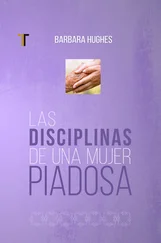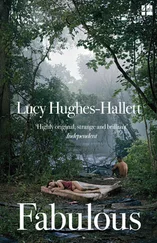The hum became a rumble and then, as though borne on its powerful wave, an answering call, articulate this time, arose from the benches opposite as all the women lifted up their voices.
We are a garden walled around,
Chosen and made peculiar ground;
A little spot enclosed by grace
Out of the world’s wide wilderness.
Cecily and Lady Harriet were singing with the rest, though I could not distinguish their voices amidst the consort.
Like trees of myrrh and spice we stand,
Planted by God the Father’s hand;
And all His springs in Zion flow,
To make the young plantation grow.
I bowed my head. The Woldingham boy’s funeral did not touch me as I felt it ought, for all the beauty of Wychwood’s chapel with its curiously twisted ebony columns, and for all the skill of the musicians and the purity of the castrato’s voice. This woodland ceremony, though, moved me. The tears that had failed to fall before pricked at my eyelids. It was as though I grieved, not for a boy with whom I was barely acquainted, but for all that have been lost. So many, many dead in a lifetime of wars. My brother. The children that he might have begotten. The children whom I have not had.
Our Lord into His garden comes,
Well pleased to smell our poor perfumes,
And calls us to a feast divine,
Sweeter than honey, milk, or wine.
Prayers followed, which seemed to me unconscionably long, and impertinent with it. Surely the Almighty does not wish to be pestered with requests for mild weather; and to thank him for the flourishing of cress and early lettuces in the garden-plots of these particular people was to make the presumption that he thus puts himself out, not for all mankind, (and rabbit-kind for that matter), but solely for the benefit of the congregation of this chapel-in-the-woods. Perhaps I was unduly irritable, but I detected a smug suggestion that God’s great munificence could be brought forward as proof that the present company might look down in unamiable condescension on those beneath them – to wit, the rest of the human race.
There was to be no sermon. Rather, anyone who chose was invited to step forward and give an account of their spiritual progress. These recitations were tedious. Petty sins; trite regrets. I had to struggle not to fidget. When a great commotion without brought the ceremony to a sudden end I welcomed it at first as a relief.
Men with staves and swords barged into the meeting place. The preacher rose up to remonstrate, but the newcomers pushed rudely by him and began to drag out certain persons. Those who had been hearkening quietly, with bowed heads, to their brethren a moment before, now set up a great hullaballoo. Men and women alike rose from their seats to obstruct the arrest of their fellows. In the mêlée I felt myself grasped firmly by the elbows and hustled down an open pathway between the benches and out by a side door.
We were in a narrow space between the building’s side and a thicket of hawthorn. A cleft in the tight-growing bushes, like the opening of a cave, showed a passageway into the forest. The man on my left was one of those who had laid hold of me before. He said, ‘Go now with all speed. Run. Follow that path. It leads to the sawmill. Thence you can return to the great house without it seeming that you have been here.’
I was flustered and angry. ‘I cannot abandon the two ladies,’ I said.
‘It is better for them, too, that you are clear of this. Run.’
Before I could argue, he and his companion had slipped back into the ‘temple’ and closed the door. Alone, I heard the shouting grow more vehement, and the ugly clatter of falling furniture. A cat flew past me, its ears back, and vanished into the wood. I went after it.
So much for what I saw and underwent. Let Cecily’s letter explain. It is not, though I was momentarily fool enough to imagine it might be, a missive of love.
You are aware that my parents were of the Parliamentary party. My father was not one of those who signed the order for the killing of the late King Charles, but he accepted his share in responsibility for that solemn and awful deed. He himself died soon afterwards.
My Uncle Woldingham, on going abroad for his safety, wisely decided to make of the division of opinion between himself and his sister, not a crack which would ever widen until our family was riven in two, but a strength. He wrote to my mother, asking her to become the steward and, for a while, the mistress of Wychwood. And so it fell out that while my cousin – heir to a great estate – grew up as a wanderer and a mendicant, I lived like a princess, roaming through Wychwood as though it were my own domain.
I was a princess in plain worsted, though, and one who sewed and scrubbed alongside her courtiers. My mother had not estranged herself from her noble family lightly, only in order to return home to live like a lady, careless of lesser folk. She filled Wychwood with those who had been my father’s fellow-revolutionaries, and sharers in his tribulations before their party prevailed.
We were like those who first heard Christ’s calling – or so we pretended. All was shared. Food, clothing, shelter. The women cared for each other’s children. The men laboured side by side. But there were those who cried out loudly against the depravity of the wealthy and the sin of covetousness, who would yet secretly take precious volumes from the library. There were others whose indignation against the ungodly led them to the brutish destruction of things, not theirs, which had been made for God’s glory. Paintings were burnt. Tapestries were hauled down to be used as blankets, and allowed to fray and tatter.
My mother began to fear the people whom she had invited to share her home. I want you to understand, Mr Norris, lest you judge us too harshly, that this was a community founded in love. Its members were sincere. But there was too much envy and too much rancour and there were those who took an obnoxious pleasure in the chastising of the ungodly.
Two women tried to leave the community – they were dragged back and beaten and forced to beg forgiveness on their knees before us all in only their smocks. Now people like us are called dissenters, but our brethren would not tolerate dissent. My mother and I slept in the long gallery, along with all the other women, some of whom were such that my mother in her earlier life would never have sat at table with them, let alone lain down alongside them. This in the name of Christian humility, but the pastor who ordered it took the great chamber for himself. In the night he would call upon such women as he said were in need of a shriving. His chosen penitent would be ushered into his room and we would hear them from behind the two sets of oaken doors – he thundering, she crying out to him and to God for mercy – and the fearsome swishing of his staff.
My mother wrote to my father’s brother, Pastor Rivers. You met him today. He came with his friends and assumed command of the community. The other pastor left early one morning, striding down the gallery over our poor bedding, his cheeks puce above his tight white kerchief, bellowing like a bullock going to the slaughterhouse. I do not know how he was prevailed upon to go. My mother and Uncle Rivers, wishing to remove their flock from the great house which had so corrupted them, established the settlement in the woods, and there our meeting-house was built.
Cecily’s letter goes on to describe a parallel world, one which permeates the one I have inhabited so blindly, as a tincture of juniper dissolves into clear water, transforming its nature unseen. To his Lordship, surveying his domain from his new-fangled sash windows, his park seems a paradise frequented only by those who toil for his pleasure. But it is populous. People cross it on paths that thread through stands of hazel and slip behind dense-growing young ash trees. People tread sunken ways of such ancient use that they traverse the park like trenches, their banks so overgrown with flowering plants that any pedestrian’s head passing there-along would show like a bladder bobbing on a foamy green stream.
Читать дальше











